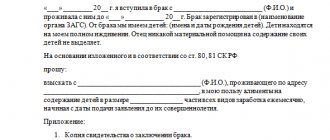How to apply for child support is asked by our family law lawyer by clients who have applied for legal assistance and who, after a divorce or even without dissolving it due to some prevailing circumstances, are left alone with minor children.
In addition to “single” mothers, there are also “single” fathers who are left alone with their children, unable to support them at their own expense, without resorting to additional financial support from the child’s second parent in the form of alimony; it is also possible for a father to file for alimony (read the procedure collection of child support in more detail at the link).
How to apply for child support
The law establishes a strict procedure for processing child support. Depending on the agreements between the spouses and the method of receiving income by the alimony payer, various methods are used to receive money for a minor. The Family Code provides only 2 options for recovery:
- In court, the court may decide to issue alimony in a fixed sum of money or in shares of income.
- Based on a voluntary agreement between spouses. The agreement reached must be certified by a notary.
Another option is to transfer alimony voluntarily. Parents themselves can agree on a certain amount that one of them will transfer to the other for the maintenance of the child. Such an agreement is usually not recorded anywhere, and then the fact of its existence is almost impossible to prove. If the alimony payer changes his mind about paying or pays less, he will have to go to court. The best option is to sign a written agreement and have it certified by a notary.
Typically, the choice of collection option depends on the financial stability, health and age of the child support provider, as well as the needs of the child. For example, child support for a healthy child and a disabled child will be different. This is due to the latter’s need for additional care, medications and rehabilitation.
Such expenses should be borne by both parents. When alimony is issued through the court, the judge takes into account the individual characteristics of the case. In a notarial agreement, the notary records only the agreement reached between the parents of the minor. But with voluntary payments, everything is on the conscience of the alimony provider.
Alimony through the court in shares of income
According to Article 81 of the RF IC, alimony as a share of income is collected from alimony workers with a stable official income. The article of the law determines the following amount: 25% for one child, 33% for two children and 50% for three or more. If the alimony pays alimony for two children, but to different mothers, then the size of the shares is distributed at 16.5% per child, respectively.
By income, according to the list approved by Decree of the Government of the Russian Federation No. 841, it is customary to understand: salary, bonuses, interest, pension, scholarship and other official payments.
To obtain child support, you need to submit an application to the Magistrates' Court. To obtain child support, you must have a judge issue an order. If it is necessary not only to arrange alimony, but also to establish paternity or challenge it, the application is submitted to the district court. The district court also considers cases of termination or invalidation of an alimony agreement.
Based on the application, a court order is issued. However, based on a court order, alimony is collected only as a share of income. (clause 3 of the Resolution of the Plenum of the Supreme Court of the Russian Federation dated December 26, 2017 No. 56). A court order is issued within 5 days from the date of receipt of the application, without summoning the parties (Article 126 of the Code of Civil Procedure of the Russian Federation). The judge sends a copy of the court order to the alimony provider.
The alimony holder has the right to appeal it within 10 days from the date of receipt of the order. After 10 days, if no objections are received, the judge issues a second copy of the court order to the recoverer or bailiff.
Voluntary payment by court judgment or order
Applying to the court with a statement of claim due to arrears in payments or disagreement with the amount of alimony ends with a decision in favor of the plaintiff. The purpose of the material security is determined in a fixed amount, providing for the repayment of the debt.
Based on the judicial opinion, a writ of execution is issued, which must be presented to the Bailiff Service.
Failure to comply with a notarial agreement to pay financial support for children is grounds for contacting the bailiff with a statement and a copy of the agreement.
Execution procedure: according to the submitted papers, the bailiff issues an order to collect a penalty from the specified person. The document (order or writ of execution) is sent to the debtor’s place of work. The official exercises control over how alimony is paid.
The writ of execution and order must be strictly implemented, regardless of the current level of income of the alimony payer. The financial circumstances of the ex-spouse may be such that it is more profitable for the recipient to agree to the proposal for a voluntary payment on his part. How to pay alimony voluntarily in this case?
For example. The former spouses entered into an agreement, certified by a notary, on monthly payments in favor of a young child in the amount of 1/4 of the father’s earnings. After 2 years, the alimony payer lost his job, and it turned out to be impossible to pay in the previous amounts. A debt has arisen.
The recipient handed over the application and agreement to the bailiff to collect the arrears. According to the order, the parent must be charged half the subsistence level for children in the region, which would be 6,000 rubles. Due to the lack of a regular salary, it was problematic to receive the required payments. The woman agreed to her ex-husband’s offer to receive 4,000 rubles. monthly, subject to withdrawal of the order.
In this case, the child will not receive the maintenance required by law. But in such a situation, it is better to receive less, but regularly, than to wait several months for the transfer of the full amount.
Alimony through the court in a fixed amount of money
Alimony in a fixed amount is collected based on a court decision. The judge can no longer consider such a case without calling the parties, and a hearing is scheduled. To obtain alimony, you need to submit a statement of claim to the court.
According to Article 83 of the RF IC, alimony in a fixed sum of money is prescribed if the alimony holder has an unstable income. The amount of the amount is determined by the court based on the interests of the child. As a rule, the amount of alimony in a fixed amount is a multiple of the cost of living per child in the region. The period for consideration of the case is up to 30 days (Article 154 of the Code of Civil Procedure of the Russian Federation). The decision comes into force immediately after it is made (Article 211 of the Code of Civil Procedure of the Russian Federation).
What is alimony
This is a material form of support addressed to one of the family members in need of help. The person in need should be supported by someone who has such an opportunity and lives separately from the recipient, for example, a parent after a divorce, an adult child, a brother or sister. Chapter 5 of the RF IC, the norms of the Federal Law “On Enforcement Proceedings”, the Code of Civil Procedure of the Russian Federation and many others are devoted to alimony obligations. You can learn more about alimony, the sources of income from which they are collected and much more by following the link:
Application to the court for the recovery of alimony
To apply for alimony, you must submit an application in writing. The application must indicate the following information:
- Name of the court.
- Details of the plaintiff (full name, address).
- Details of the defendant (full name, address).
- Plaintiff's claims. All requirements must be justified and documented.
- List of attached documents.
- Signature and date.
For documents you will need a copy of your passport, a copy of the child’s birth certificate, a copy of the marriage or divorce certificate, and a 2-NDFL certificate from work. It will also be useful to have receipts confirming expenses for the child. When filing an application, copies will be sufficient, but you will need to bring the originals to the court hearing.
The state duty in cases of collection of alimony is not charged (clause 5 of the Resolution of the Plenum of the Supreme Court of the Russian Federation dated December 26, 2017 No. 56).
How to find out online if you have a debt?
To find out the amount of alimony debt, you need to go to the FSSP website in the section data bank of enforcement proceedings. Next, in a special search column, you need to enter your full name, date of birth and region of residence (you can just use your last name and first name). After seconds of searching, all information about open enforcement proceedings will be displayed (bailiff contacts, amount of debt, etc.).
You can also check whether an application for collection has been submitted on the State website and on the MFC website. And, of course, you can find out the amount of debt directly from the bailiffs if you call them or come to the department in person.
The amount of the debt is determined based on the earnings and other income of the child’s father for the period during which alimony was not withheld. If the payer did not work during this period, then the debt is determined based on the average salary in the Russian Federation at the time of collection.
Information about alimony arrears is publicly available . Both debtors and recipients of alimony can use the bailiffs' website.
Alimony by agreement with a notary
Drawing up an agreement on alimony is not difficult. To do this, both parents need to contact a notary office. The agreement is concluded in writing. Such a document is not inferior in force to a court decision or order. The agreement can subsequently be terminated only through court.
According to Article 103 of the RF IC, the amount of alimony under the agreement should not be lower than the amount of alimony that the court would collect. According to the agreement, alimony can be paid as a share of earnings or as a fixed sum of money.
Sources:
RF IC Article 81. Amount of alimony collected from minor children in court
RF IC Article 82. Types of earnings and (or) other income from which alimony is withheld for minors
Resolution of the Plenum of the Supreme Court of the Russian Federation dated December 26, 2017 No. 56 On the application of legislation by courts when considering cases related to the collection of alimony
Code of Civil Procedure of the Russian Federation Article 126. Procedure for issuing a court order
RF IC Article 83. Collection of alimony for minor children in a fixed amount of money
Decree of the Government of St. Petersburg No. 396 of June 18, 2019 On establishing the cost of living per capita and for the main socio-demographic groups of the population in St. Petersburg for the 1st quarter of 2021
RF IC Article 103. Amount of alimony paid under an agreement on the payment of alimony
Responsibility
In the vast majority of cases, a man cannot refuse to pay alimony on his own. Even if he lost his job or other source of income, payments will still have to be made. Only the court can exempt from payments in exceptional situations.
It is definitely worth monitoring other situations in which the debtor may try to hide his income. For example, if he works as an individual entrepreneur, he will also have to make payments. Only there is quite complicated accounting, which you will need to understand together with the bailiffs.
The same applies to situations where the defendant at work receives severance pay upon dismissal, financial assistance or money for vacation. In these cases, payments must also be made.
Remember, if the debtor’s salary is increased or your child is disabled, you can also demand an increase in the amount of alimony. However, there are circumstances in which they may be reduced, for example if the defendant becomes injured or disabled. It is important to monitor this very carefully.
Also remember, if you do not agree with the decision, or think that the amount of alimony is set too low, you can file an objection to the court about this.
If the defendant does not make payments, or he has accumulated a large debt, you have the right to calculate the penalty and demand compensation through the court.
In some cases, bailiffs may even initiate criminal proceedings. If the debtor maliciously evades payments, you have the opportunity to deprive him of parental rights.
You can file for alimony in court: at any time, if there is no agreement
Clause 1 of Article 107 of the Family Code of the Russian Federation
Child support can be collected for the previous 3 years: if the parent evaded paying it
Clause 2 of Article 107 of the Family Code of the Russian Federation
An application to the court for the recovery of alimony can be submitted: at the place of residence of the plaintiff
Clause 3 of Article 29 of the Code of Civil Procedure of the Russian Federation







